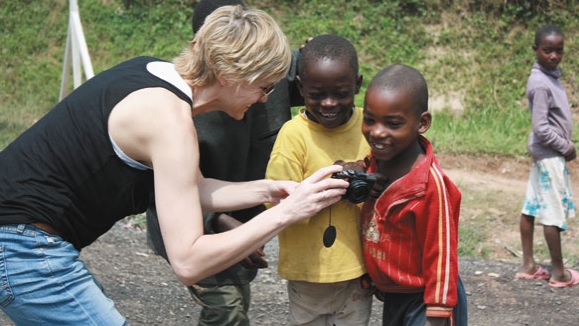
This op-ed originally appeared on Politico.
I learned about the conflict in Congo because Javier Bardem was under the weather. Javier was supposed to join John Prendergast, co-founder of the Enough Project, at a screening of "The Greatest Silence," a film showcasing the use of rape as a weapon of war by militias in Congo, but he was too sick to attend. I was the last-minute replacement.
While the film was playing, John and I sat outside on the sidewalk and he told me what was going on in the eastern Democratic Republic of Congo. It is the deadliest conflict in the world since World War II. It has been described as the worst place in the world to be a woman. And there are links between people in the U.S. and what helps to fund this war.
As the film was wrapping up, John asked me to come on stage with him and summarize what I had just learned. There was no acting on that stage. I was strongly reacting to what I had just heard and knew that I would not let it go.
In 2011, I traveled to eastern Congo to better understand the root causes of the conflict. My knowledge of the war was through facts and terrible statistics — like 5.4 million deaths in under two decades — but I had yet to meet those who had been living through it.
I spent two weeks traveling throughout eastern Congo with members of the Enough Project's Raise Hope for Congo Campaign. On my son's 18th birthday, we visited a child soldier rehabilitation center. I sat and talked with boys who were the same age as my son, yet they could not be in a more different situation. There were approximately 100 boys there, ranging from 5 to 18, who had been recently rescued from armed groups in the area.
We also met with women who were survivors of sexual violence. In Congo, women and girls face the threat of attack from armed militias, the military and even the local police. Militias use rape as a weapon of war by targeting women, the backbone of Congolese communities and society.
There was no way I could have prepared myself for the stories I heard, yet I was the only one crying. The women I met were full of courage, hope and a vision for a better Congo.
The women, and other Congolese I met, asked for more engagement from the U.S. government and the international community. There is no shortage of amazing people, courage and vision in Congo, but there is a lack of international political pressure being leveraged for change there. I returned to Washington with the stories of the Congolese people I met, ready to advocate on their behalf.
D.C. is similar to Hollywood in some ways. You meet with people in the hopes of getting to others, hoping that closer and closer to the centers of power, certain doors will open.
Since I got back from eastern Congo, I have pushed to open the doors to the policymakers who will make a difference there. I have met with top aides at the White House, State Department and on Capitol Hill, and earlier this year, I hand-delivered a petition to the White House, written by women in eastern Congo. There have been some great successes as the result of the activist movement for peace in eastern Congo that I am a part of, but much more needs to be done.
Joining with Congolese women to advocate for peace is how, for me, the term "use your celebrity" first held meaning.
Celebrities have the ability to raise awareness for a cause, secure an important meeting and elevate the voices of the voiceless. We get to skip to the front of the line. One thing I can do is serve as a megaphone to amplify the voices of Congolese women, repeating the horrors many endure in Congo, and call for more action.
Progress has been significant and successes are blossoming in eastern Congo. Now more than ever, the U.S. government has the opportunity to ensure lasting peace. A U.N.-mediated peace process is needed, and President Barack Obama and Secretary of State John Kerry can increase the U.S. government's diplomatic engagement to make sure all Congolese voices, like those of the women and young boys I met, are heard.
The bigger the movement calling for U.S. government involvement and increased transparency in Congo's minerals sector, the better chance the Congolese people have for peace. To learn more, check out RaiseHopeforCongo.org.

